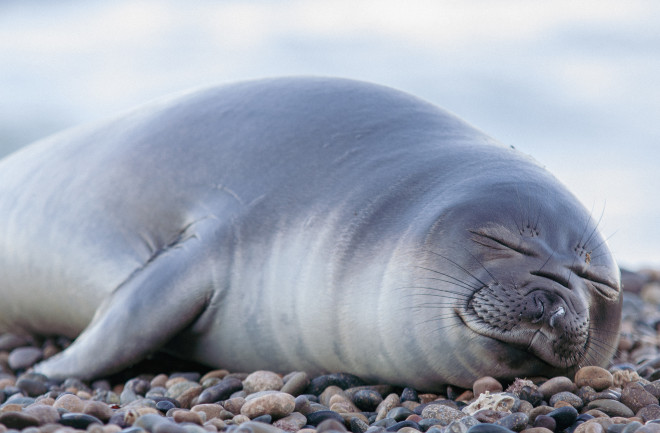Elephant seals don’t need a hypnotist to spiral them deep into sleep: New research reveals that these marine mammals take deep, spiraling dives to catch a few short power naps every day while on long ocean voyages — so few that they might be the recorder-holders for sleep deprivation among mammals during these periods.
“That’s pretty much unparalleled compared to any other mammal,” says Jessica Kendall-Bar, a marine biologist with the Scripps Institution of Oceanography at the University of California San Diego.
Do All Mammals Sleep?
All mammals need sleep, even if it’s minimal. Until recently, the record holder for sleep deprivation was the African elephant, some of which can get by with about two hours of sleep a day.
Researchers know that creatures like dolphins manage to sleep in the ocean by turning off only half of their brains at a time, while fur seals can sometimes sleep with their whole brain, and sometimes with only half.
But Kendall-Bar and her colleagues wanted to learn more about how true seals, like northern elephant seals, accomplished sleep in the deep ocean. They also raised concerns that human noise and other activity may disrupt the animals' complex sleeping patterns that evolved over eons, especially during long annual migrations.
Read More: These Animals Get Creative To Get Some Sleep
Tracking Sleeping Animals
For the new study, published recently in Science, the team attached devices with sleep monitors — as well as accelerometers, temperature loggers and other tracking and monitoring equipment — to 13 juvenile female northern elephant seals they captured on the beach just north of the University of California, Santa Cruz.
They tracked the seals as the animals conducted two of their annual migrations to forage for food. On land, northern elephant seals typically have no problems with insomnia, sleeping about 10 hours on average. But the tracking and monitoring devices didn’t show many opportunities for rest during these two journeys. In fact, the researchers only detected the animals sleeping for brief periods while deep in the ocean.
Read More: Yellow-Bellied Marmot Sleeping Habits Offer Clues to Longevity
Do Elephant Seals Sink When They Sleep?
Kendall-Bar and her team also created a special program to help them visualize the way that the seals moved in the deeper ocean — as far as 300 meters below the surface, where tracking them any other way would be nearly impossible. The program showed that the seals seemed to lose control of their posture under the water while they slept.
“They do these amazing sleep spirals where they sink dozens of meters,” Kendall-Bar says.
On average, the juvenile seals they tracked took naps that only lasted about five to 10 minutes, during longer dives that lasted 15 to 20 minutes. By contrast, the scientists found that older seals were able to sleep more soundly, taking naps that averaged about 25 minutes during even longer dives.
The seals took a few of these per day, but not many by human standards. On their initial 80-day foraging trip, the elephant seals surveyed only got an average of one hour of sleep per day. On the longer 220-day trip, they caught about two hours of sleep per day.
Read More: An Ancient Otter-Like Seal Used Whiskers to Find Food 23 Million Years Ago
Why Do Elephant Seals Sleep Like This?
Kendall-Bar says that the team believes the seals sleep in this way to avoid sneak attacks from orcas or great white sharks.
“They have to get to a depth that’s safe enough from predators,” she says. “We think they can sleep at sea because they adapted the ability to dive deep and for long periods.”
Still, this beneficial evolutionary adaptation may be under threat from human activity. While northern elephant seals aren’t listed as threatened or endangered, Hawaiian monk seals —a related species that likely sleeps using a similar strategy — are. What's more, development and human activities in Hawaii are encroaching on the monk seals' beach habitat, which may mean they have to find more sleep at sea rather than on land.
Kendall-Bar and her colleagues are working together with the National Oceanic and Atmospheric Administration to learn more about the sleeping patterns of this species, considered endangered by the U.S. Fish and Wildlife Service, to see how they might be affected.
Read More: A Fascinating Exploration Into How Dinosaurs Slept

